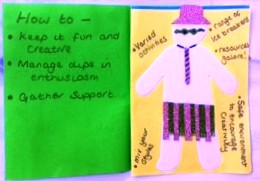Home News & Views Time is of the essence
Time is of the essence
Kate Sanders, FoNS Practice Development Facilitator

I have just returned from a fantastic week of learning at the beautiful Herstmonceux Castle in East Sussex. FoNS was hosting the International Practice Development School and the team of facilitators (me, Jo Odell and Maria Mackay from the University of Wollongong, Australia) had the pleasure and privilege of working with 31 very enthusiastic participants from across England, Wales and Canada.
 In the afternoons, the participants worked in three groups to explore their questions and issues from practice, working together to share experiences, unearth new knowledge and identify their own solutions. What I found interesting was that across all three groups, a common concern was how to motivate/engage staff. This was based on their experiences and/or perceptions of working with people who did not seem motivated to become engaged in activity to develop and improve practice and the experience of both patients and staff. There was also the challenge of how to keep motivated on return to work, or when times felt tough.
In the afternoons, the participants worked in three groups to explore their questions and issues from practice, working together to share experiences, unearth new knowledge and identify their own solutions. What I found interesting was that across all three groups, a common concern was how to motivate/engage staff. This was based on their experiences and/or perceptions of working with people who did not seem motivated to become engaged in activity to develop and improve practice and the experience of both patients and staff. There was also the challenge of how to keep motivated on return to work, or when times felt tough.
The participants came up with a number of different ideas, including a motivation toolkit; however, a common theme was a need to know the other person. For example, we need to know what people value, what they think is important, what they would like to achieve and how they can be supported to do this. People like to feel that they have some choice and a voice in deciding what will happen and how. There was the realisation that first and foremost, human connection and relationships are fundamental, and that their role can be in leading and modelling the  way, stopping and taking time to make those connections and to develop those relationships.
way, stopping and taking time to make those connections and to develop those relationships.
Why is it then that in a profession that I believe is fundamentally about relationships, we seem to have allowed the value that we place on relationship building to become eroded? I meet and work with many nurses and health and social care teams and a common discussion is often about the lack of time; time for supervision, time for team meetings, time to talk to patients etc. But this is not always the case. Some of the care home teams that we are working with as part of the Teaching Care Homes programme prioritise relationships and making connections, and as a consequence, somehow they seem to create and have more time to be with others.
I have recently read the transcript of the first speech of the new health secretary, Matt Hancock and have to confess to being somewhat disappointed. Whilst I welcomed the fact that workforce issues were his first priority, I was saddened to read that his main solution seemed to centre around more skills-based training. Is it really more skills and competencies that nurses need, or the time and opportunity to be with others to unearth the wealth of knowledge that they already hold, but don’t get time to explore, and time to develop this knowledge into creative ideas for improving practice and the experience of patients, their families and staff? If we truly want to address workforce issues, perhaps our attention should turn towards enabling and facilitating connections and relationship building, giving staff a chance to get to know each other as persons, recognising and celebrating individuality, but also working towards the development of a shared understanding of what matters and the creative ways that this can become a reality.
That sounds much more motivating to me! What do you think?
Comments are closed.

